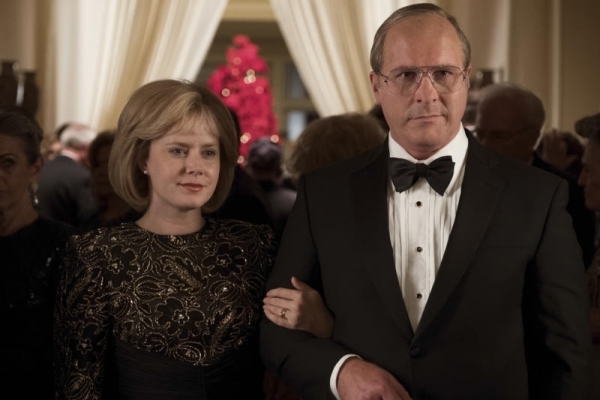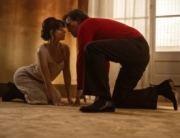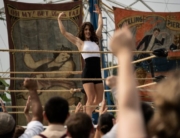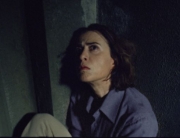Realized by a superb ensemble, Vice cleverly tells two true stories: the joint biography of Dick Cheney and Lynne Vincent of Casper, Wyoming, and Dick learning to manipulate the levers of power in Washington, DC for his own purposes. In doing so, writer/director Adam McKay entertainingly and irreverently warns that Dick’s personal and political saga may have permanently changed the vice presidency in a way that even a master politician such as Lyndon B. Johnson couldn’t achieve.
The opening scene does not foretell a successful career for 22-year-old Cheney (Christian Bale) in 1963, as he is pulled over while blotto drunk by a cop in Casper. Fast forward to the morning of September 11th, 2001, in Washington, as 60-year-old VP Cheney (Bale now looking startlingly like the hefty, balding politician) is rushed by the Secret Service to an emergency operations center.
The narrator (Jesse Plemons), who sometimes appears on screen in Everyman activities, muses how Cheney saw 9/11 as his opportunity to gain power. The story line then flashes back to Dick’s youthful (and blown) opportunities in a quick montage until he is scared straight by his girlfriend, Lynne (Amy Adams in a ferocious performance). Furious that as a girl she can’t go to an Ivy League school, run a big company, or be mayor, she has to latch onto a man who can. According to her, they seem to be headed into “a trailer with 10 kids” at the rate Dick is going. She is also haunted by her past with a violent alcoholic father and a submissive mother. He promises to live up to her high expectations, and there’s a quick progress of marriage, babies, and draft deferment, leading to his stint as a congressional intern in 1968. He immediately hones in on Republican Congressman Donald Rumsfeld (Steve Carell) for his mentor while sucking up to staffers, like Roger Ailes, around Richard Nixon.
In a lovely scene that is repeated as key for the couple, he proudly calls his wife from his new, tiny West Wing office to share in his achievement of a staff appointment in 1971, while she’s cooking dinner and carrying a baby: “We did it!” Later, when Rummy is banished from the Nixon administration by Henry Kissinger, Dick moves on to profitable political consulting, and Lynne starts writing articles. When she is dragged back to Wyoming for her mother’s funeral, Dick accompanies her and steps up to protect her and their two daughters from her father. His fond care for his family remains a constant. And fly fishing, too, which the film frequently returns to between flash forwards to how he took over the new war on terrorism after 9/11.
After Watergate, President Ford brings Rumsfeld and Cheney back to the White House to join his cabinet. Dick befriends young Antonin Scalia in the Office of Legal Counsel, and they share a belief in the “Unitary Executive Theory.” McKay illustrates their concept of an all-powerful presidency with the kind of ironic humor he displayed in The Big Short (2015). But Carter wins, and the Cheneys head back to Wyoming, where Dick is a terrible candidate for Congress, and he collapses with a heart attack. But Lynne vigorously campaigns for him, and they return to DC and stay through the 1980s; he’s in Congress, and she heads the National Endowment for the Humanities. She gloats at a formal reception: “Half of the room wants to be us; the other half fears us.”
In a moving sequence, their tearful daughter Mary (Alison Pill) confesses she likes girls to her father’s support and her mother’s political disappointment; Dick spurns running for higher office to protect Mary from anti-gay right wingers. So, after serving five terms, Dick goes on to head up the oil-related multinational Halliburton, and Lynne publishes books. McKay imagines their happy ever life in suburbia with their family and starts running the credits.
But in 2000, Dick gets a call from presidential candidate George W. Bush (Sam Rockwell) and is asked to be his running mate. McKay stages Dick considering the offer in bed with Lynne as a brilliant paean to Shakespeare’s ambitious couples the Macbeths and Antony and Cleopatra, with dialogue in iambic pentameter. Before accepting, Dick negotiates with Bush to manage the bureaucracy, military, energy, and foreign policy. After the election, Cheney astonishingly establishes offices in the White House, Senate, House of Representatives, Pentagon, and CIA; appoints neo-conservatives; and cultivates think tanks and media. The panoply of characters planning tax cuts, deregulation, and a takeover of Iraq’s oil fields will be meaningful mostly to political geeks who lived through this time, and they are depicted with McKay’s satirical touch on reality. (In one example, harsh anti-terrorism options are presented as glib menu offerings by waiter Alfred Molina.)
While Dick’s physical heart problems are a continuing symbol of the possibility of his own death, the numbers of those killed and the profits generated in the never-ending wars he helped to initiate scroll by toward the end, and he faces the camera directly to proffer his defiant justification to protect the country against what he calls monsters. He even almost smiles. Obviously, this satire will appeal mostly to those who can catch the names, references, and events that fly by quickly. While those markers will be missed by others, they will get enough of the humor, a la The Daily Show, to follow and chuckle along.

















Leave A Comment